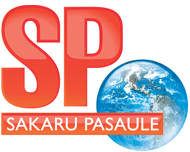|
Annotation This is a thrilling time to close the last pages of the millennium and to start a new one. Nobody of us has experienced something like this before. A new era dawns also in communication branch. We are witnesses of a vast variety of evolutionary and revolutionary changes in mobile communications, broad-band data transmission, totally new computer generation and supernetwork Net 21. Advanced transatlantic optical cable networks make access to Internet easier and quicker.
In this issue:
Hearty conversations today and tomorrowThe first Latvian mobile operator Latvijas Mobilais Telefons (LMT) celebrated its seventh anniversary or as it is called by LMT itself the Independence Day. The first independent steps of the company date back to October, 7, 1992 when the first NMT450 base station was built in Riga and mobile traffic did not have to go via Helsinki any more. The amount of customers has grown from 1027 during the first year to about a thousand every 34 days reaching 172 256 bythe middle of October. It is planned that by the end of the year the revenue of LMT will reach 60 million lats. LMT offers its customers safe high quality mobile communications and advanced services. LMT is a member of GSM MoU since 1993 and takes part in the most significant international events, also in the well-known Telecom \'99 (LMT was the only representative from Latvia), where it had an originally designed and well attended stand.
Telemedicine saves human livesThe significance of telemedicine, especially in distant and hard-accessible areas, is well known in Western count- ries but for Latvia it is only a future prospect. Experts of Informatics department, Catastrophe Medicine centre and Radiology clinic are sure that telemedicine could solve various problems, connected with remote expert assistance during complicated operations as well as X-ray pictures, analysis or medical history transmission to any hospital, connected into common data network. With the assistance of Swedish Baltic Sea Information Technology Fund the elaboration of pilot project BITNET (Baltic International Telemedicine Network) is started in Latvia. The first stage of BITNET envisages to install national networks in all the states involved in the project (with centres in Tartu, Riga and Kaunas), the second to interconnect them with Uppsala (Sweden) university hospital network. Latvia national network will connect P. Stradiņš hospital in Riga (the centre) with the hospitals in Ventspils, Liepāja, Daugavpils and Latvian Oncology CentreEuroRings Internet of the third millenniumIn the project EuroRings, elaborated by KPNQwest company, a totally new technological concept of Internet infrastructure is used. It is based on a new, fast optical fibre network, consisting of six bi-directional self-healing data transmission rings. A powerful transatlantic cable will connect Euro-Rings with USA Qwest Macro CapacityTM Fiber Network. It is planned that in 2001 EuroRings will connect 40 largest business centres in Europe, its length will be about 13000 km, but data transmission speed more than 600Mbitps.
Optical access transport environment with unlimited capabilitySince autumn a new broad-band optical fibre network installation for Lattelekom business customers is started in Riga. By the end of the year the first stage of optical access network (OPT) installation will be completed. OPT configuration allows easier and much faster subscriber lines connection. The new network is predicted for high-speed data transmission and intelligent services as Ethernet (10 Mbitps), Fast Ethernet (100 Mbitps), SDH and ATM (155 Mbitps and 622 Mbitps) and Gigabit Ethernet (1000 Mbitps). Next generation optical transmission technologies and WDM systems are capable to provide fantastic speed 320 Gbitps, but producers are already preparing new 1,1 Tbitps systems.
Criminals are stopped... by modern technologiesAlcatel Fraud management system Alma FMS is a highly flexible system that can detect existing and emerging types of fraud, helping to reduce it to a minimum. The unique combination of a comprehensive rule-based module, extensive call querying and an adequate algorithm for the automatic detection of customer usage variation, allows near real-time analysis of call data. Three levels of severity can be configured by the operator for each fraud indicator to create alarms which match patterns defined by specific combination of indicators.
WAP an overturn in mobile servicesWireless Application Protocol (WAP) provides a universal open standard for bringing Internet content and advanced Value Added Services to mobile phones and other wireless devices. It is the platform for the new generation of media phones. WAP makes possible a wide range of wireless services which are independent of the underlying digital wireless network technology.
Merry Christmas and successful New Millennium!
|
|



